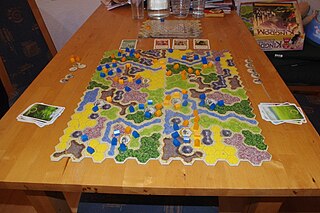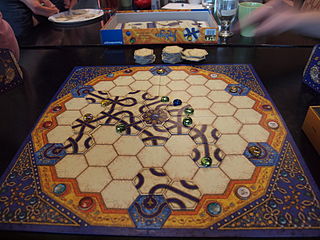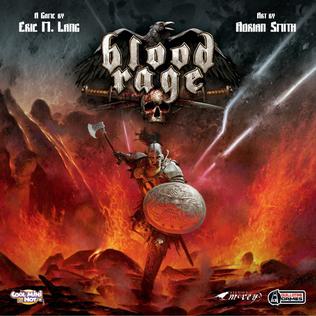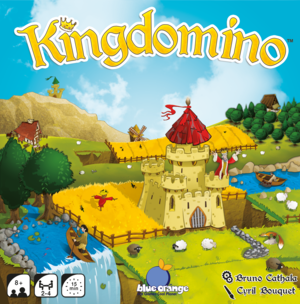
A Eurogame, also called a German-style board game, German game, or Euro-style game, is a class of tabletop games that generally has indirect player interaction and multiple ways to score points. Eurogames are sometimes contrasted with American-style board games, which generally involve more luck, conflict, and drama. They are usually less abstract than chess or Go, but more abstract than wargames. Likewise, they generally require more thought and planning than party games such as Pictionary or Trivial Pursuit.

Reiner Knizia is a prolific German-style board game designer.

El Grande is a German-style board game for 2-5 players, designed by Wolfgang Kramer and Richard Ulrich, and published in 1995 by Hans im Glück in German, by Rio Grande Games in English, and by 999 Games in Dutch. The game board represents renaissance-era Spain where the nobility fight for control of the nine regions. El Grande was praised for its area-control mechanism, and was awarded the Spiel des Jahres prize and the Deutscher Spiele Preis in 1996. Following its release, several expansions and an alternative version were published.

Railway Rivals is a railroad-themed board game that was originally published by Rostherne Games in 1973. A German language edition was released by Bütehorn in 1979, and a mass-market edition in the UK by Games Workshop in 1985. The game involves railway building and operations.

Alhambra is a 2003 tile-based German-style board game designed by Dirk Henn. It was originally published in Germany by Queen Games in a language-interdependent version; an English-specific version was released in North America by the now-defunct Überplay. The game is an Arabian-themed update, set during the construction of the Alhambra palace in 14th century Granada, of the 1998 stock trading board game Stimmt So!, which in turn was an update of the 1992 mafia influence board game Al Capone; the original version was subsequently released as Alhambra: The Card Game. Upon its release, Alhambra won numerous awards, including the Spiel des Jahres award. Its success has led to the release of numerous expansion packs and spin-off games, and is becoming Queen Games' flagship franchise.

Tikal is a German-style board game designed by Wolfgang Kramer and Michael Kiesling and published in 1999 by Ravensburger in German and by Rio Grande Games in English. Set in a Central American jungle, in Tikal players aim to discover artifacts, excavate, and maintain temple control to gain victory points.

Hare and Tortoise is a Eurogame designed by David Parlett in 1974 and first published by Intellect Games. In 1978 it was released by Ravensburger in Germany, and received generally positive reviews critically and won the 1979 Spiel des Jahres. It has since sold some 2 million units in at least ten languages. The current editions are published by Gibsons Games in the UK, Ravensburger in Germany and Rio Grande Games in the United States.

Niagara is a German-style board game designed by Thomas Liesching and published in 2004 by Zoch Verlag and Rio Grande Games. In Niagara, which is set in the Niagara Falls, players collect, transport, and steal gems. Upon its release, the game won several awards, including the 2005 Spiel des Jahres.

Agricola is a Euro-style board game created by Uwe Rosenberg. It is a worker placement game with a focus on resource management. In Agricola, players are farmers who sow, plow the fields, collect wood, build stables, buy animals, expand their farms and feed their families. After 14 rounds players calculate their score based on the size and prosperity of the household.

Qwirkle is a tile-based game for two to four players, designed by Susan McKinley Ross and published by MindWare. Qwirkle shares some characteristics with the games Rummikub and Scrabble. It is distributed in Canada by game and puzzle company Outset Media. Qwirkle is considered by MindWare to be its most awarded game of all time. In 2011, Qwirkle won the Spiel des Jahres. A sequel, Qwirkle Cubes, was released by Mindware in 2009.

Kingdom Builder is a strategy board game designed by Donald X. Vaccarino, published in 2011 by Queen Games with illustrations by Oliver Schlemmer in German, British and international versions.
Zev Shlasinger is a scriptwriter, game designer and game publisher. He is primarily known for founding Z-Man Games, which became the publisher of the Pandemic series of board games, as well as being the sole publisher for the English editions of popular Eurogames, such as Carcassonne and Terra Mystica.
Um Reifenbreite is a bicycle racing themed board game for two to four players. It was invented by Rob Bontenbal.

Indigo is a 2012 tile-laying board game developed by Reiner Knizia and published by Ravensburger.

Blood Rage is a Viking themed board game designed by Eric Lang and published by CMON Limited in 2015. Each player controls a clan of mythological Vikings seeking glory as Ragnarok approaches. Played in three ages or rounds, Blood Rage features card drafting, battles and territory control via forces represented by sculpted plastic miniatures. All conflicts are resolved through playing cards, and cards are also used to improve and differentiate the different clans and the leaders, warriors, ships and monsters at their command.

Kingdomino is a 2016 tile board game for 2-4 players designed by Bruno Cathala and published by Blue Orange Games. In this 15-20 minute, family-oriented game, players build a five by five kingdom of oversized domino-like tiles, making sure as they place each tile that one of its sides connects to a matching terrain type already in play. The game was critically successful and won the 2017 Spiel des Jahres award, and was followed by several spin-offs and expansions.
Karuba is a tile-laying race game for 2–4 players, designed by Rudiger Dorn and published by HABA in 2015. Each player has 4 explorers, which move through the jungle on the player's private board in order to discover treasure and reach hidden temples. The game was nominated for the 2016 Spiel Des Jahres award.

Metro is a board game by Dirk Henn, for 2 to 6 players.

Cascadia is a 2021 board game designed by Randy Flynn and published by Flatout Games. In Cascadia, player draft and add habitat tokens and matching wildlife tokens to score victory points based on various scoring conditions. Upon its release, Cascadia received critical success, with reviewers praising its components, accessibility, and strategy, but also noting its lack of player interaction. Cascadia won the 2022 Spiel des Jahres.















